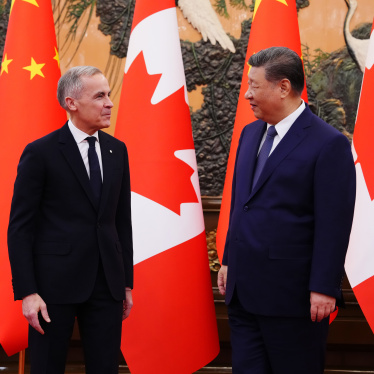Bolivian military personnel implicated in human rights violations must be tried in civilian rather than military courts, Human Rights Watch said today after the Constitutional Court upheld civilian court jurisdiction in a case involving alleged killings by army troops.
Today’s court ruling involves four soldiers accused of killing civilians during street clashes in February 2003. Bolivia’s military court system had asserted jurisdiction over the case, an approach that the Constitutional Court rejected.
“For years, Bolivia’s military courts have insisted on trying members of the armed forces accused of violating human rights, but then almost invariably acquit them,” said José Miguel Vivanco, executive director of Human Rights Watch’s Americas Division. “The Constitutional Court’s judgment is consistent with international standards that require courts hearing human rights cases to be independent and impartial.”
On February 16, the Permanent Tribunal of Military Justice acquitted four soldiers accused of the murder of Ana Colque Quispe, a nurse, and Wilmer Collanque Paye, a building worker, during street clashes in La Paz in February 2003. Carla Espinoza, a doctor, was seriously injured in the shooting incident.
Also on February 16, a La Paz district court turned down two appeals filed by the victims’ relatives and the attorney general’s office, which had challenged the military court’s power to hear the case. The Constitutional Court ruling reverses the district court’s decision and awards jurisdiction over the February 2003 events to the civilian courts.
The street clashes began on February 12, 2003, when members of the Bolivian police mutinied in La Paz in protest against low pay and tax hikes. Several policemen and soldiers were killed and wounded during exchanges of gunfire between the police and the army close to the presidential palace. Riots and looting continued on February 13 as the army took control of the city’s security. In all, 16 civilians, 10 police, and five soldiers were killed in the disturbances.
In an amateur video that became key evidence in the investigation, a group of soldiers can be seen firing from the street at a rooftop where Collanque was carrying out repairs. Ana Colque was killed and Carla Espinoza was wounded while they were trying to help Collanque after a bullet struck him.
Prosecutors in the attorney general’s office filed charges in August 2003 against 16 army and police officers in connection with the February 2003 events. The civilian investigation has been hampered by a lack of cooperation from the army, which has refused to allow its personnel to testify. On March 29 the commander-in-chief of the armed forces, Admiral Luis Alberto Aranda, wrote to the La Paz district attorney threatening legal action if civilian prosecutors continued summoning officers to testify. Moreover, the prosecutors were denied access to the evidence collected by the military court as well as its findings.
A lack of military cooperation has also stalled investigations into the death of at least 59 people in September and October 2003, when army troops opened fire on demonstrators during anti-government protests sparked by plans to export Bolivian natural gas through Chile. Following a public outcry at the deaths, then-President Gonzalo Sánchez de Lozada and his cabinet resigned.
Although civilian prosecutors have questioned senior police officers and political leaders about the events, the ministry of defense has reportedly refused to authorize soldiers to be interviewed, on the grounds that military justice officials were conducting their own investigation. So far, however, no police or army personnel have been charged with the deaths either in the civilian or military courts.
The U.N. Human Rights Committee has repeatedly called on countries to subject military personnel implicated in human rights violations to civilian court jurisdiction. The Inter-American Commission on Human Rights has also found that independence and impartiality are clearly compromised when countries permit investigations to be conducted by the same institutions that may be responsible for the crimes. The “de facto impunity,” that results from such investigations has a corrosive effect on the rule of law and violates the principles of the American Convention on Human Rights, the commission has stated.
“It is high time for the Bolivian army to recognize that its members will be held accountable if they commit abuses,” Vivanco said.







